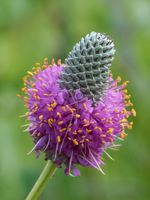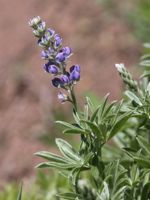Mon-Fri 9am - 5pm Mountain time
Purple Prairie Clover vs Silky Lupine
Dalea purpurea
Lupinus sericeus
NOT AVAILABLE THIS SEASON - MIGHT RETURN
CUSTOM GROW
Purple Prairie Clover is a native perennial wildflower known for its striking purple blooms. The flower heads grow as dense spikes on tall stems, with each flower head containing many tiny blossoms. Blooming for 4–6 weeks in the summer, it attracts a variety of pollinators, including bees and butterflies.
The high protein content of the Purple Prairie Clover makes it excellent forage for wildlife and birds like to feed on its seeds. As a nitrogen-fixing plant, it enriches the soil, improving fertility and benefiting nearby vegetation. These ecological contributions make it a great choice for pollinator gardens, prairie & rangeland restoration, naturalization, and re-vegetation efforts.
This drought and heat-tolerant plant thrives in various soil conditions, including rocky soil, making it remarkably easy to grow in challenging environments.
Silky Lupine is a native perennial wildflower known for its upright spikes of blue to violet flowers. Blooming from late spring into summer, the nectar-rich, showy blossoms attract a variety of pollinators, especially bees and butterflies. The plant’s fine, silky foliage provides soft texture and visual interest, enhancing landscapes throughout the growing season.
Silky Lupine is a nitrogen-fixing plant that enriches soils and supports surrounding vegetation. Its deep roots stabilize soil, and it spreads naturally by ejecting seeds from drying pods. If spread isn’t desired, new seedlings are easy to remove. While it is foraged by some wild animals, it contains alkaloids that are toxic to livestock. Silky Lupine is well-suited to pollinator gardens, naturalization plantings, erosion control, and ecological restoration projects.
Purple Prairie Clover Quick Facts
Silky Lupine Quick Facts
Toxicity: toxic to sheep and other livestock

